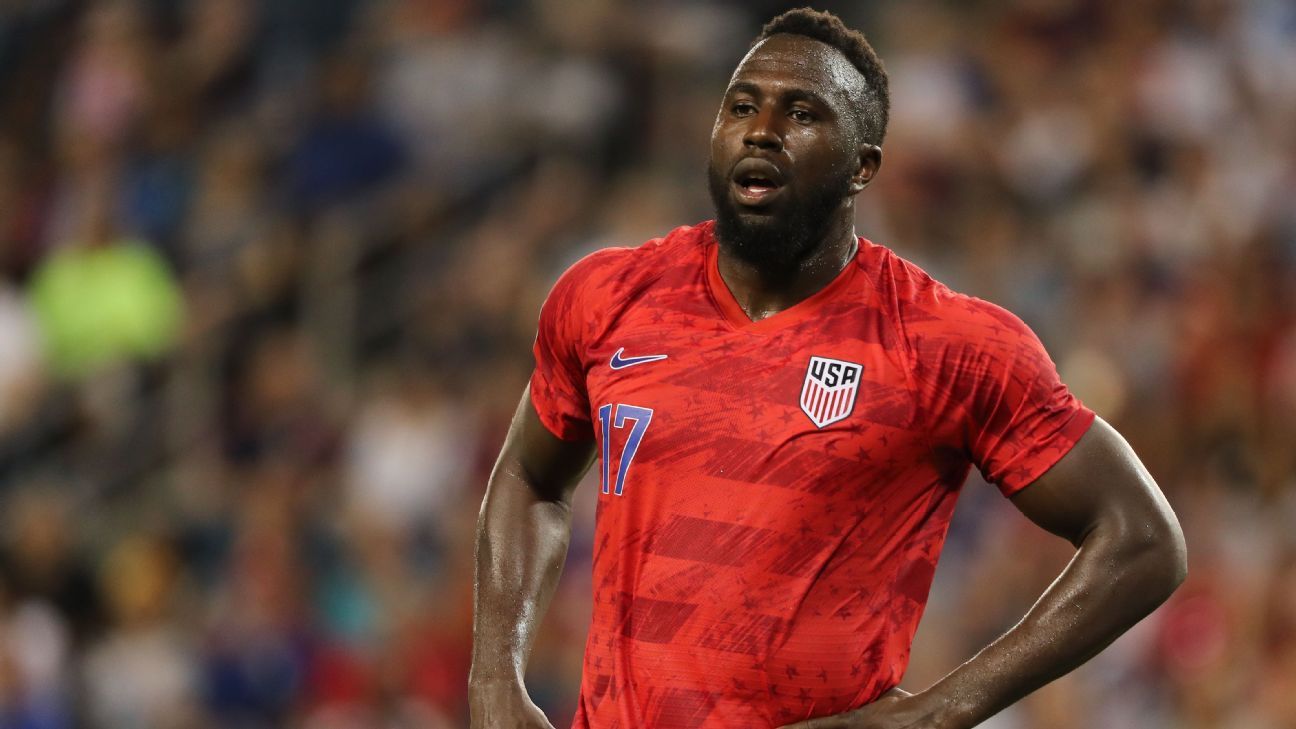
NASHVILLE, Tenn. -- Back on June 8, at an otherwise run-of-the-mill pregame news conference ahead of a friendly against Venezuela, U.S. men's national team manager Gregg Berhalter said that when forward Jozy Altidore "is fit and strong, there's not a better striker than him in America."
If that's the case, Berhalter's assessment hasn't always been in alignment with how he's doled out minutes at the Gold Cup. Gyasi Zardes has been the preferred starter for much of the tournament, while Altidore has officially logged 99 minutes. There was a 16-minute garbage-time stint in the 6-0 hammering of Trinidad and Tobago, then 83 minutes in a relatively meaningless group-stage finale against Panama in which he nonetheless bagged the winning goal.
To be fair, Altidore was carrying the remnants of a hamstring injury when he first arrived at U.S. training camp at the beginning of June. But one would have thought he had proved his fitness in the Panama match. When it came time to name his lineup for the quarterfinal against Curacao, Berhalter persisted with Zardes.
When asked about Altidore's availability for Wednesday's semifinal against Jamaica, Berhalter called the hamstring injury "irrelevant" and added, "Jozy is exactly where we need him to be." When pressed if that meant the forward is ready to play against the Reggae Boyz, Berhalter said, "Yeah, he's been ready to play."
-- Berhalter: U.S. needs to win Gold Cup for it to be a success
-- Carlisle: U.S. takes step back in unconvincing win over Curacao
Whether that means Altidore will actually start is another matter altogether. But there seems to be little doubt that his presence up top, and his ability to act as an auxiliary playmaker to Christian Pulisic, would provide a boost to the U.S. attack.
That is by no means the only attacking issue, as Berhalter admitted that against Curacao, the team's spacing "became disconnected."
"A lot of times in buildup you saw [a 4-1-5] or something like that where Michael [Bradley] would drop on the other side of the line and have only Weston [McKennie] central, or Michael would be central and we would have five guys high, and that's just not proper spacing," he said. "It becomes very difficult to get any kind of offensive flow when that's what your shape looks like."
That spacing had a ripple effect defensively in that Bradley and McKennie were out of sync and unable to prevent passes into Curacao's attacking players. Given Jamaica's ability on the counter, the U.S. midfield will need to be much better positioned in transition moments Wednesday.
"I think their wingers are high-quality players," Berhalter said. "I think they have a different gear of speed than we've seen in this tournament and in the beginning of June."
One player the U.S. will need to keep an eye on is winger Leon Bailey. The Bayer Leverkusen attacker has yet to score for Jamaica in the tournament, but the U.S. will be no less wary.
"[Bailey is] very left-footed. He wants to come in and shoot from the top of the box area," U.S. defender Tim Ream said. "He's very pacy and likes to work in transition."
Just how much the U.S. can take from last month's 1-0 friendly defeat to the Reggae Boyz is up for debate. Only three U.S. players who started that match will likely take the field Wednesday. But seven Jamaica starters from that match played in the 1-0 quarterfinal victory Sunday over Panama, so in terms of style and personnel there might be a bit more carryover against the U.S.
In that match, the Reggae Boyz certainly showed there is more to their game than just attacking on the break. Jamaica was judicious in terms of when it applied pressure in midfield, with Sheffield Wednesday midfielder Michael Hector in particular proving adept at determining when the U.S. was vulnerable as it tried to play out of the back.
Of course, the U.S. midfield that takes the field Wednesday will be completely different from the one that played Jamaica a month ago, with Bradley and McKennie relied upon to provide a shield in front of the back line. Jamaica manager Theodore Whitmore is more than aware of this change, going so far as to say his biggest concern is "in the middle of the park."
Pulisic will be available as well, and his ability to threaten in the open field will do plenty to keep Jamaica from being too adventurous with its defensive pressure.
Teams have had success in the past by focusing on Pulisic and daring some other U.S. attacker to beat them, though Whitmore insisted that his team will be mindful of other American attacking threats.
"We don't want to concentrate on any one player," he said. "We see that we analyze the U.S. as a team. You have experience. Bradley, he can damage your team, so we don't want to pay attention to any one player and get hurt on the other side."
Keeping Jamaica honest in terms of its defensive focus will require getting more out of wingers Tyler Boyd and Paul Arriola, who were largely ineffective in the quarterfinal against Curacao. If they can deliver, that should ensure that the U.S. will move one step closer to its tournament goal.
"We've said all along the success of this team will be measured by if we're going to win this tournament or not," Berhalter said. "We want to get to the final. We want to win the final."
The U.S. is two wins away from accomplishing that goal, but first Jamaica stands in the way.















 Phone: (800) 737. 6040
Phone: (800) 737. 6040 Fax: (800) 825 5558
Fax: (800) 825 5558 Website:
Website:  Email:
Email: 






